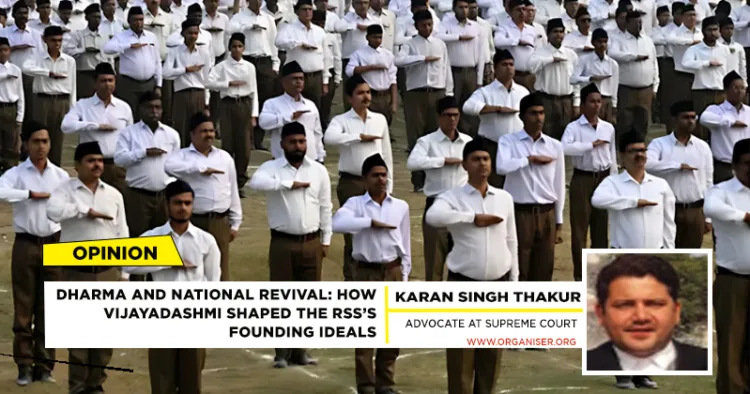The Rashtriya Swayamsevak Sangh (RSS) was founded by Dr Keshav Baliram Hedgewar on Vijayadashmi, 1925—an intentional choice rooted in profound symbolism. Vijayadashmi, or Dussehra, is a day celebrated across Bharat as the triumph of dharma over adharma, a victory of righteousness symbolized by Lord Rama’s defeat of Ravana and Goddess Durga’s victory over Mahishasura. For Dr. Hedgewar, this day was far more than an occasion for celebration; it represented the essence of his vision for Bharat’s revival—an organised effort to restore the nation’s cultural identity and moral strength.
The Strategic Choice of Vijayadashmi
Vijayadashmi is a celebration of victory—not just military conquest, but the triumph of values, discipline, and self-sacrifice. Dr Keshav Baliram Hedgewar saw the deep spiritual resonance on this day as reflective of the work that lay ahead for the RSS. The choice of this date was meant to remind every swayamsevak (volunteer) of the moral duty to uphold and protect Bharat’s culture and values in the face of oppression, division, and erosion of national pride.
In Hedgewar’s eyes, Bharat was not simply a geographical entity; it was a living civilisation whose roots extended far beyond the colonial rule that had ravaged the nation’s spirit. He recognised that the real battle was not just against the British, but against the disintegration of Bharatiya unity and the loss of cultural self-esteem. The founding of the RSS on Vijayadashmi was a call to action—signifying the fight to restore Bharat’s ancient moral fabric and rekindle its sense of unity.
Dr. Keshav Baliram Hedgewar’s Vision: Reclaiming Bharat’s Glory
Dr Hedgewar’s mission for the RSS was clear from its inception: it was to be a force for uniting Bharat’s people through service, discipline, and the promotion of Bharatiya culture. He believed that a strong, cohesive society rooted in shared values and traditions was essential to Bharat’s future. The RSS was to be the vehicle through which this revival would take place, with swayamsevaks playing the role of protectors and nurturers of Bharat’s civilizational heritage.
The foundation on VijayaDashmi further symbolised this broader vision. Just as Vijayadashmi celebrates the victory of divine forces over evil, the RSS was conceived as a movement to overcome internal and external forces that threatened Bharat’s unity and identity. Hedgewar believed that national strength could only be achieved by instilling a deep sense of cultural pride and collective responsibility in every citizen.
Vijayadashmi: A Symbol of National Revival
Vijayadashmi holds particular relevance in the context of Bharat’s struggle for independence and national rejuvenation. It is a day that inspires courage, resilience, and moral clarity—qualities that Hedgewar wanted to instill in the future generations of swayamsevaks. The symbolism of Rama and Durga’s victories was not merely mythological, but a reminder that every generation must rise to protect and preserve the righteous path.
By aligning the birth of the RSS with Vijayadashmi, Hedgewar ensured that the organisation’s work would always reflect the spirit of this sacred day—an unyielding commitment to national service, cultural preservation, and moral leadership. The RSS was meant to stand as a bulwark against the forces that sought to weaken Bharat from within, by creating a disciplined cadre of individuals dedicated to the idea of a unified, strong, and self-sufficient Bharat.
Nation-Building through Cultural Awakening
Dr. Hedgewar’s vision extended far beyond the immediate need for political freedom from British rule. He foresaw that Bharat’s real challenge would come after independence, when the nation would have to rebuild its identity and integrity from centuries of colonization. For him, the strength of Bharat lay in its people’s ability to connect with their heritage, embrace their cultural roots, and rise above societal divisions. The RSS was his instrument to achieve this renaissance.
By choosing Vijayadashmi as the foundation day of the RSS, Hedgewar anchored the organisation’s ethos in the timeless principle of victory through righteousness. His foresight was clear: only a society that upholds dharma, cultivates moral discipline, and fosters national unity can emerge victorious against all adversities.
The Legacy of Vijayadashmi and the RSS
Today, the RSS stands as a testament to Dr Hedgewar’s vision, playing a vital role in shaping Bharat’s socio-cultural landscape. The values of seva (selfless service), unity, and cultural pride that Hedgewar infused into the organization continue to resonate with millions of swayamsevaks, inspiring them to serve the nation with dedication and resolve. The message of Vijayadashmi, which celebrates the triumph of light over darkness, continues to guide the RSS in its mission of nation-building and cultural revival.
Dr Hedgewar’s choice of Vijayadashmi was not merely symbolic, but strategic. It provided the RSS with a moral and cultural anchor—a reminder that the real fight for Bharat’s future is the ongoing struggle to protect its values, its heritage, and its unity.
By founding the RSS on the sacred day of Vijayadashmi, Dr Keshav Baliram Hedgewar set in motion a movement that would carry forward the timeless principles of dharma, national unity, and cultural preservation. His vision was to create a disciplined, morally driven force that would ensure the resurgence of Bharat as a strong and unified civilization. The choice of Vijayadashmi as the foundation day is a powerful testament to Hedgewar’s understanding of Bharat’s spiritual and cultural identity—one that continues to inspire millions in their service to the nation.


















Comments